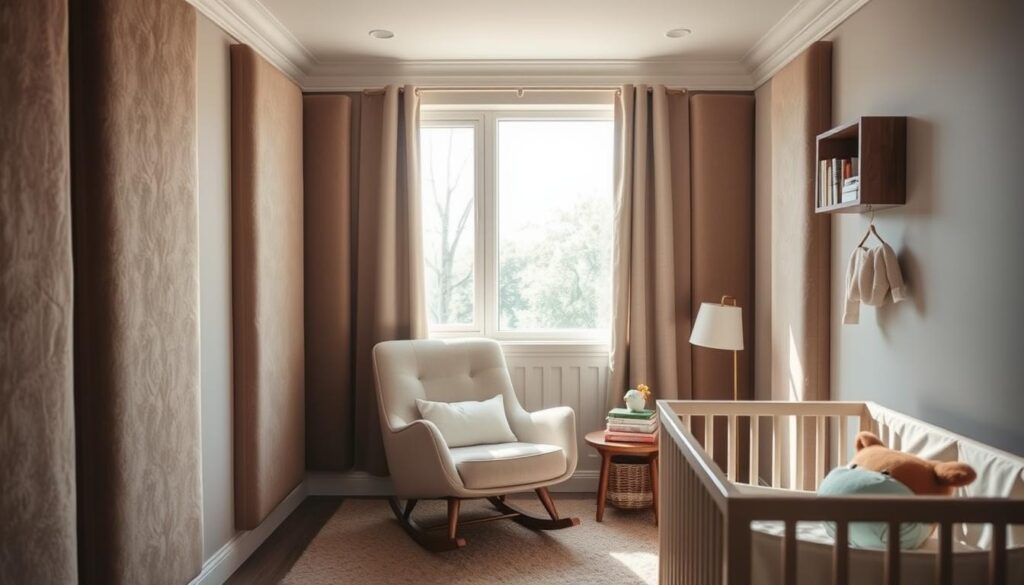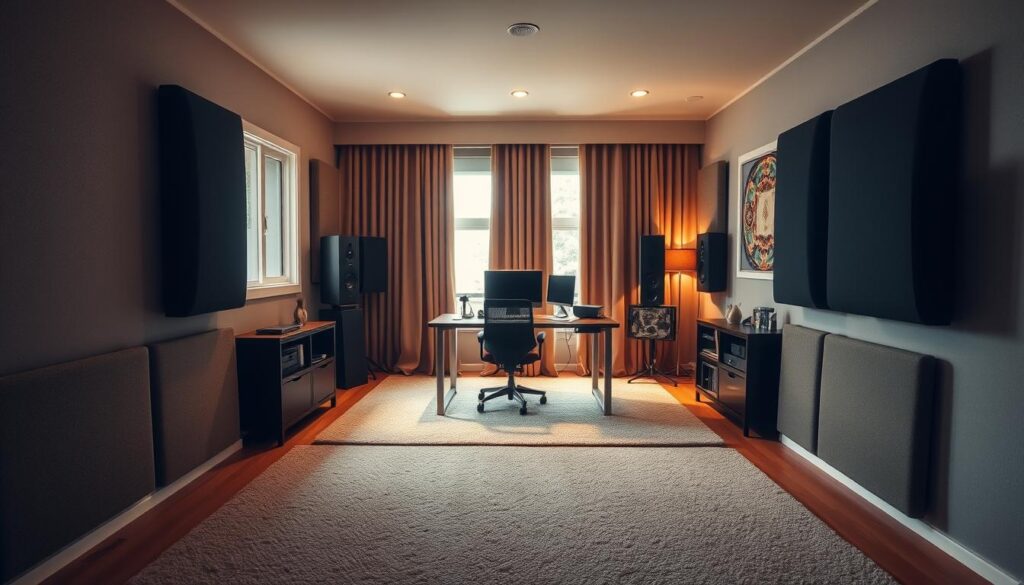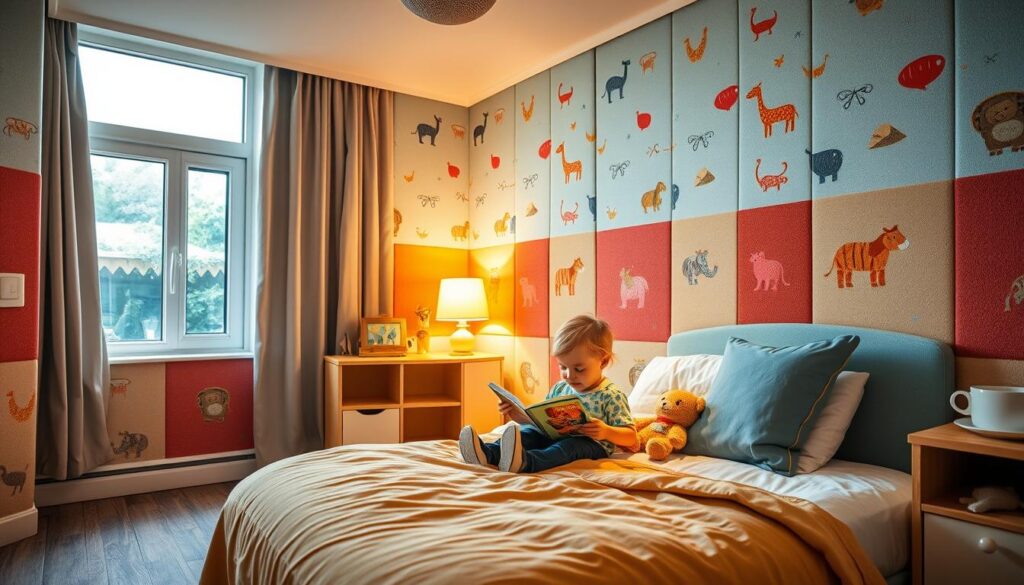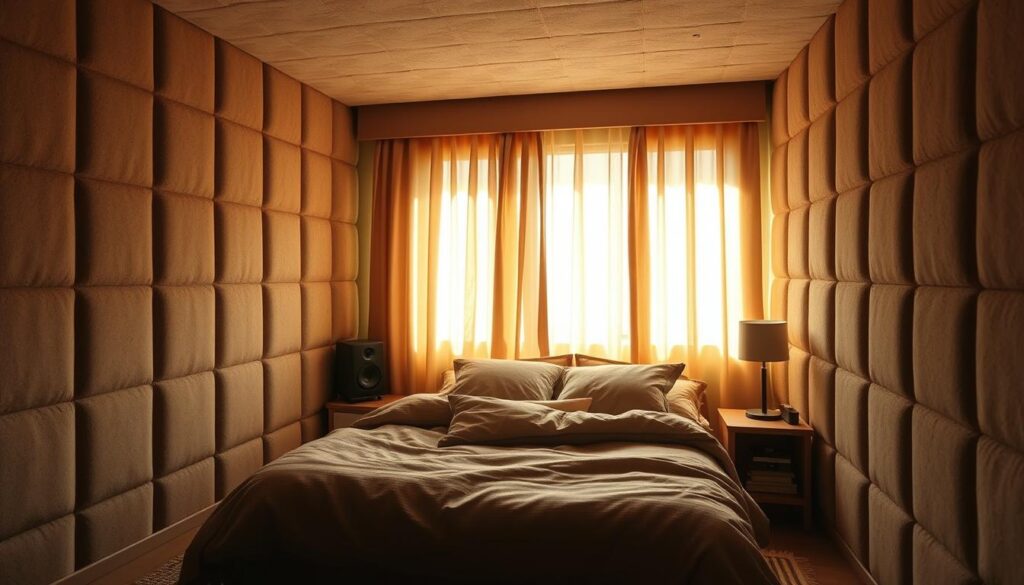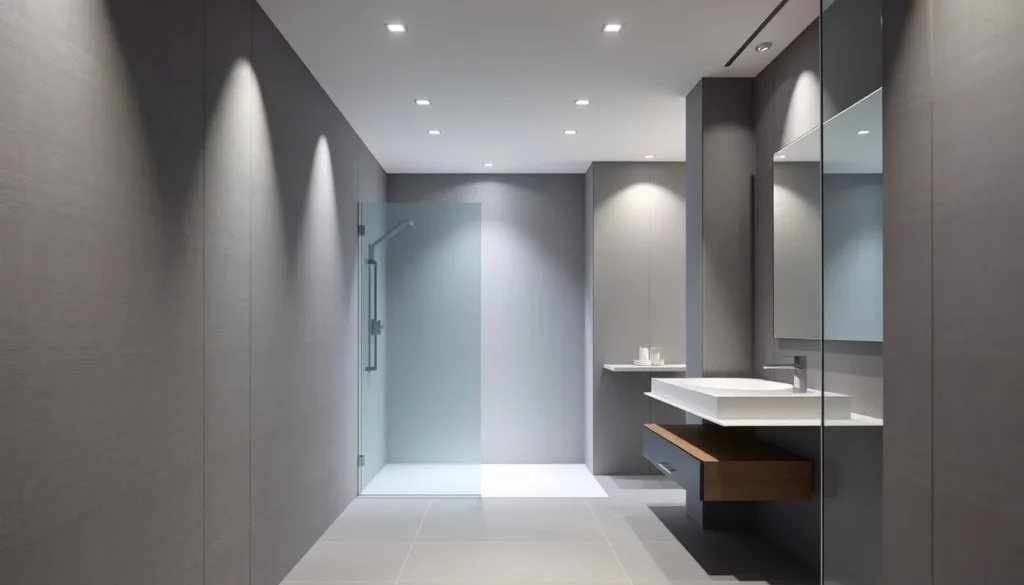Creating a peaceful space for your baby is key for their growth and happiness. The World Health Organization (WHO) says noise pollution can harm children. It can affect their thinking, increase stress, disrupt sleep, and harm their ability to focus and remember.
To reduce these risks, think about using soundproofing solutions in your baby’s room. You can use baby monitors to keep noise down. Playing soothing lullabies can also help make the room calm. Plus, having a regular sleep training routine is important.
By making your baby’s room quiet and using these methods, you can help them sleep better and feel better overall.
Understanding the Importance of Soundproofing for Nurseries
Soundproofing your nursery is essential, not just a luxury. It ensures your baby’s room is a peaceful place. Noise can harm your baby’s sleep and growth, making soundproofing key for parents.
A baby’s environment is vital for their growth. Too much noise can hurt their health and happiness. By understanding soundproofing, you can make your nursery calm and quiet.
Why Sound Matters in a Baby’s Room
Sound is crucial in a baby’s room because it affects their sleep and calmness. A quiet space helps babies sleep well, which is important for their growth. Too much noise can make babies cranky and slow their development.
The Impact of Noise on Infants
Noise can deeply affect infants, not just their sleep but also their growth. Studies show that loud noises can raise stress, harm hearing, and slow brain development. Lowering noise helps your baby grow better.
Creating a Calm Atmosphere for Sleep
Creating a calm space is key for babies to sleep well. This means soundproofing, keeping the room cool, and dimly lit. Soundproofing materials for baby rooms help block outside noise, making a peaceful sleep space.
Good soundproofing can greatly improve your baby’s sleep. This is good for their health and happiness. It also makes your home a more peaceful place for everyone.
Common Sources of Noise in Nursery Environments
Noise can come from many places in a nursery. Knowing where it comes from is the first step to making it quieter. This helps in creating a peaceful space for your baby.
Outside Noise: Traffic and Neighborhood Sounds
Outside noise is a big problem in nurseries. Sounds from traffic, airplanes, and neighborhood talk can get in. It’s important to find ways to block these noises to keep the nursery quiet.
Indoor Noise: Siblings and Household Activities
Indoor noise is also a big issue. Sounds from siblings, household chores, and family members moving around can be loud. Looking into how to reduce these sounds is key to a quieter nursery.
Sounds from Appliances and Electronics
Home appliances and electronics can also make a lot of noise. From refrigerators to electronic devices, these sounds can wake a baby. Choosing quieter options or soundproofing can help a lot.
By tackling these common noise sources, you can make your nursery quieter. This makes your home more comfortable for everyone, including your baby.
Effective Soundproofing Materials for Nurseries
Creating a peaceful nursery starts with the right soundproofing materials. The choice depends on the noise you’re trying to block.
Sound-Absorbing Solutions are key for less echo and ambient noise. Acoustic panels on walls or ceilings absorb sound waves well.
Acoustic Panels and Foam
Acoustic panels soak up sound energy, cutting down on echo. They come in different sizes and materials like fiberglass or mineral wool. Acoustic foam is great for high-frequency noise.
Blocking Noise is vital. Soundproofing curtains and drapes are perfect for this. They block outside noise when hung over windows.
Soundproofing Curtains and Drapes
Soundproofing curtains are thick and block sound waves well. They come in many styles and can match your nursery’s look. These curtains make your baby’s room quieter.
Insulation is key for soundproofing walls and ceilings. It stops noise from moving between rooms.
Insulation Options for Walls and Ceilings
There are many insulation types, like fiberglass batts, cellulose, and spray foam. These can be put in walls and ceilings to cut down sound transmission. This makes your nursery quieter.
Dampening Impact Noise is important, too. Rugs and carpet solutions can soak up noise from footsteps or dropped toys. They also make the nursery warmer and cozier.
Rugs and Carpet Solutions
Thick, plush rugs and carpets can dampen noise from footsteps or dropped toys. They also add warmth and comfort to the nursery, making it a cozy space for your baby.
DIY Soundproofing Techniques for Baby Rooms
You can make your nursery quieter with simple DIY soundproofing. It’s key for a peaceful space that helps your baby sleep and grow. You don’t need to spend a lot or hire someone; many DIY methods work well.
Sealing Gaps and Cracks
Sealing gaps and cracks is a basic but effective DIY soundproofing trick. Gaps around windows, doors, and electrical outlets let in a lot of noise. Use acoustic caulk or weatherstripping to close these gaps. It cuts down on noise and saves energy too.
Adding Soft Furnishings for Absorption
Adding soft items is another budget-friendly way to soundproof your nursery. Things like blankets, curtains, and furniture can soak up sound, making it less echoey. Think about thick curtains or drapes on windows and area rugs or carpets on floors.
Rearranging Furniture for Better Sound Control
How you arrange your nursery’s furniture matters for soundproofing. Placing furniture in smart ways can block or soak up sound. For instance, a bookshelf or big piece of furniture against a shared wall can block noise. Also, setting up furniture to act as a buffer between noisy areas and your nursery helps.
With these DIY soundproofing tips, you can make your nursery quieter. This leads to better sleep and health for your baby.
When to Consider Professional Help
If you’re having trouble making your nursery quiet, it might be time to get help from a pro. DIY methods can work for small issues, but bigger problems need a soundproofing expert.
Assessing Your Soundproofing Needs
First, figure out what you need to quiet your nursery. Look at where noise is coming from and where it’s escaping. Think about your room’s layout and the type of noise you’re dealing with. This will help you decide if you need a pro.
Hiring a Soundproofing Specialist
A soundproofing expert can give you a plan that fits your nursery. They’ll check your room, suggest the best materials, and make the changes needed. Make sure to choose someone with nursery experience and good references.
To find the right expert, try these steps:
- Ask friends and family for recommendations or check online reviews
- Look for professionals in associations like the National Council of Acoustical Consultants
- Get quotes from different experts to compare prices and services
Evaluating the Cost vs. Benefits
Thinking about the cost and benefits is key when deciding to hire a pro. Professional soundproofing might seem pricey at first, but it can improve your baby’s sleep and even increase your home’s value. Consider the long-term gains to see if it’s worth it for your family.
Key benefits of professional soundproofing include:
- Custom solutions for tough noise problems
- Expert knowledge of soundproofing materials and methods
- Long-lasting results
- Potential boost in your home’s value
By carefully looking at your needs, finding the right expert, and weighing the costs, you can make a smart choice for your nursery’s soundproofing.
Tips for Maintaining a Quiet Nursery Environment
Creating a calm nursery is key for your baby’s growth. A quiet space helps your baby sleep better and feel better overall. To keep it peaceful, try a few strategies.
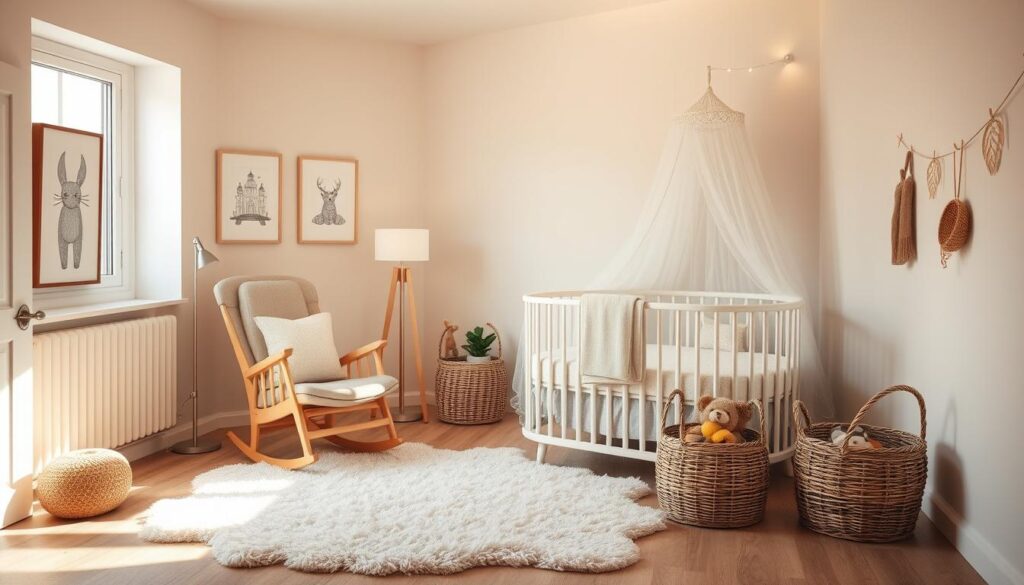
Establishing Quiet Hours
Setting quiet hours is a smart move. Pick times of the day for less noise. This makes a steady, quiet spot for your baby to rest. Tell your family about these times to get everyone on board.
Educating Siblings on Noise Awareness
If your baby has siblings, teach them to be quiet around the nursery. Encourage them to be gentle and quiet. Make it fun by turning it into a game or using a “quiet sign” on the door.
Using White Noise Machines
White noise machines are great for a calm nursery. They make a steady sound that covers other noises, helping your baby sleep. You can find them online or at baby stores, or use apps on your phone. For more tips, check out Acoustical Surfaces.
These steps can really cut down on nursery noise. It makes a quieter space for your baby to rest and grow. Keeping the nursery quiet is a big job, but it’s good for your baby’s health and growth.
Also, think about other quiet nursery ideas like using sound-absorbing materials and rugs. Keep the nursery away from loud areas. These ideas together can make a cozy space for your baby.
Soundproofing for Shared Baby Rooms
When multiple babies share a nursery, keeping it quiet is tough. The noise from crying, cooing, and play can be overwhelming. But, with smart soundproofing, you can make a quieter space for your babies to rest and grow.
Challenges of Noise with Multiple Children
Having many kids in one room makes it hard to keep it quiet. Some big challenges are:
- More noise from crying, babbling, and playing.
- It’s hard to find and fix the source of the noise.
- More babies mean more need for sleep and comfort.
Creative Solutions for Shared Spaces
Here are some creative ways to soundproof a shared nursery:
- Optimize the room layout: Move furniture to cut down on echo and noise bounce.
- Use sound-absorbing materials: Add acoustic panels, soundproofing curtains, and area rugs to soak up sound.
- Implement noise-reducing strategies: Use white noise machines or fans to cover up background sounds.
- Seal gaps and cracks: Make sure all windows, doors, and walls are tight to stop noise from getting out.
By trying these ideas, you can make a shared nursery quieter. This helps your babies sleep better and feel more at peace.
Eco-Friendly Soundproofing Options
Eco-friendly soundproofing is growing fast. It’s good for the planet and your baby’s health. As a parent, you want a quiet nursery that’s also green.
Sustainable Materials to Consider
For eco-friendly soundproofing, many materials are available. Here are a few:
- Recycled denim insulation is great for sound and is safe for babies.
- Natural wool insulation is sustainable and absorbs sound well.
- Acoustic panels can be made from recycled stuff or natural fibers like cotton or hemp.
- Eco-friendly curtains and drapes block noise and are made from heavy, dense materials.
Benefits of Going Green for Your Nursery
Choosing eco-friendly soundproofing helps the planet and your baby’s health. Improved air quality and reduced chemical exposure are big pluses. It shows you care about the environment as a parent.
Here are some main benefits:
- It’s better for the environment because it uses sustainable materials.
- It makes the air inside your home cleaner by avoiding chemicals.
- Your baby will have a healthier place to grow and play.
The Role of Technology in Soundproofing
Technology is key in modern soundproofing, offering many solutions for nursery noise. It uses the latest soundproofing tech to make a quieter space for your baby.
Advanced Soundproofing Materials
High-tech soundproofing materials offer better noise reduction. They include advanced acoustic panels and smart curtains that can be controlled by apps. For more info, visit soundproofing resources.
Smart Home Devices for Noise Control
Smart home devices change how we handle noise at home. They include smart white noise machines and noise monitoring systems for your nursery. These can be controlled from anywhere, making it easy to adjust settings. For more on smart home devices, check smart home soundproofing solutions.
Using technology in soundproofing has many benefits:
- Enhanced Noise Reduction: Advanced materials and devices cut down noise levels a lot.
- Convenience: Smart devices let you control and monitor your nursery’s sound from anywhere.
- Customization: Many smart solutions can be adjusted to fit your needs, offering a more personal approach to noise control.
By using these tech advancements, you can make your nursery a peaceful and comfy place for your baby. This improves their sleep and overall health.
Common Myths About Nursery Soundproofing
Many myths surround nursery soundproofing. As a parent, knowing the truth can help you create a quiet space for your baby.
Some parents think soundproofing is too expensive. Let’s look at these myths and what’s really true.
Debunking Misconceptions About Costs
One big myth is that soundproofing costs too much. But, there are many affordable options. Here are some facts:
- Soundproofing materials vary in price, from cheap to expensive.
- Small changes, like sealing gaps and adding soft items, can make a big difference without spending a lot.
- Soundproofing can lead to better sleep for both babies and parents in the long run.
Understanding How Soundproofing Actually Works
Another myth is that soundproofing removes all noise. But, it actually makes the environment quieter. Here’s how it works:
- Soundproofing uses materials and methods to block or absorb sound waves.
- Each material works better against certain sounds.
- Using a mix of soundproofing methods usually works best.
By understanding how soundproofing works, you can make better choices. It’s about finding a balance between cost, effectiveness, and what works best.
The Long-Term Benefits of Soundproofing a Nursery
Investing in nursery soundproofing does more than just make a peaceful space for your baby. It also brings long-term benefits for your whole family. Soundproofing can greatly improve your child’s sleep, your own rest, and your home’s comfort.
Improved Sleep Quality for Infants
Soundproofing a nursery is key for better sleep in infants. A quiet place helps your baby fall asleep quickly and sleep deeply. Studies show quiet spaces lead to better sleep for babies, cutting down on sleep problems.
Positive Impact on Parents’ Sleep
Soundproofing isn’t just good for babies; it helps parents sleep better too. A quiet nursery means parents won’t wake up to every baby noise. This is crucial for new parents, who often don’t get enough sleep. Well-rested parents can better care for their babies and handle parenting’s challenges.
Enhancing Overall Home Comfort
Soundproofing does more than just improve sleep. It makes your whole home more comfortable. By lowering noise, you create a peaceful space for everyone. This leads to a more relaxed home life, less stress, and better well-being.
| Benefits | Description | Impact |
|---|---|---|
| Improved Infant Sleep | A quiet environment helps babies sleep better | Enhances baby’s development and reduces sleep-related issues |
| Better Sleep for Parents | Less disturbance from nursery noises | Improves parents’ rest and ability to care for their baby |
| Enhanced Home Comfort | Reduced overall noise levels | Creates a more peaceful and harmonious home environment |
In conclusion, soundproofing a nursery offers many benefits. It improves infant sleep, enhances parents’ rest, and boosts home comfort. By investing in soundproofing, you create a healthier, more comfortable home for your family.
Conclusion: Investing in Soundproofing for Your Baby’s Health
Creating a peaceful nursery is key for your baby’s health and growth. Understanding the nursery soundproofing importance helps you make the right choice. This choice supports your baby’s well-being.
Key Benefits and Solutions
Soundproofing your nursery greatly improves your baby’s sleep and health. Using soundproofing materials and DIY methods can block outside noise. This creates a calm space. The soundproofing benefits for infants are many. Investing in soundproofing makes your home healthier for everyone.
Creating a Peaceful Environment
By focusing on soundproofing for baby health, you can make a nursery that aids in healthy growth and sleep. Start preparing a peaceful nursery. It will support your baby’s health and happiness.
